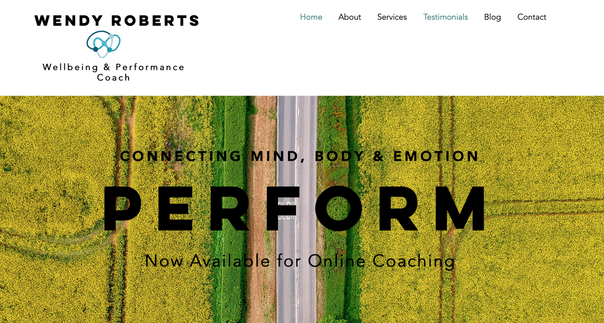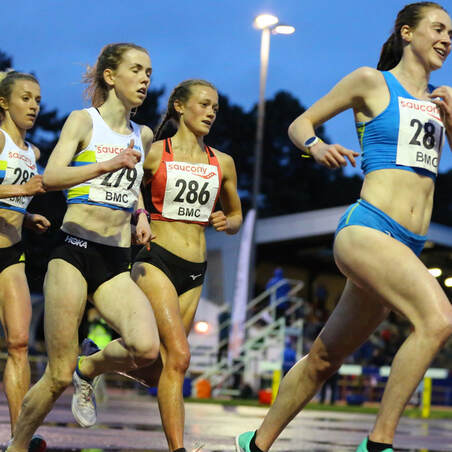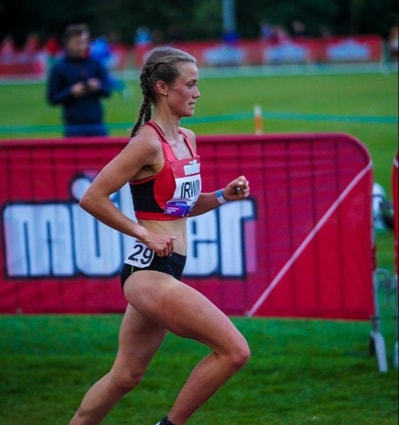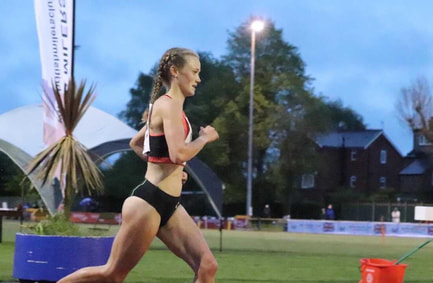|
A blog about my experience with coaching psychology and how my mental wellbeing affects my performance. One of the most important aspects of running, that is quite often the most complex to crack, is the mental side of it. This doesn’t have to be directly in relation to running, but the impact our mental well-being has on our performance. It can be difficult to understand why we are thinking the way we are and to not let our minds overwhelm us. Whilst this is exhausting normally, it can also make training and racing to the best of our ability incredibly difficult. For me personally, the correlation between my mental-wellbeing and my performance is huge. If I am not feeling mentally strong, confident or stable, or have a lot on my mind, my performance can take a significant hit, and it has in the past. An inability to understand why my brain thinks in the ways it does and not being able to catch my thoughts before they massively spiralled downhill, led to a period of mental instability which initiated a cycle of under eating and over exercising. It also meant I was in no mindset to be able to train or compete to the best of my ability. I crumbled as soon as anything got too difficult because I couldn’t cope with the daily stressors I was facing outside of running. Frequently, running would push me over the edge mentally because I was already stepping over that fine line. Roughly 18 months ago, I made the executive decision to do something about this. I was already being mentored in regards to my wellbeing by the incredible human that is Wendy Roberts, but we decided I could benefit more from formal coaching sessions. Wendy's passion and willingness to guide, educate and allow individuals to understand the complicated nature of their thoughts has been instrumental in my development as an individual and as an athlete. Without Wendy, I’d have risked falling back into that downwards spiral on multiple occasions, but she has provided me with the tools to develop a sense of agency and become an autonomous individual who can confidently chase after their dreams. What is well-being coaching? Wendy is a wellbeing and performance coach who offers coaching in positive psychology. She works with individuals inside and outside of sport, but takes extra interest in those seeking to overcome the barriers preventing them from achieving their goals. Wendy works to get you to recognise that the mind, body and emotions are all interconnected, encouraging you to get out of your head and develop your self confidence. These are all ideas that I struggled to comprehend and felt Wendy could guide e towards recognising. Wendy’s key focus is on positive psychology. ‘Positive psychology is the science of human flourishing and achievement which offers a vast array of resources to help people find the sense of wellbeing and performance they seek.’ (wendyroberts.co.uk, 2020) My coaching ethos is person-centred and the work is a collaborative process that takes into account your strengths, goals and insights with a view to developing your self-confidence in your own abilities. How has it helped me?
Initially, I wasn’t sure whether coaching psychology could benefit be. I am a very open book and tend to discuss what is on my mind with a lot of my friends, so I couldn’t see how talking to someone could help me. However, I’ve noticed huge developments since I began my journey with Wendy. Working with Wendy has allowed me to make sense of the complex matrix that is my mind, and I continue to develop as an individual with every session. Wendy initially started as a mentor for me. She was an imperative figure that I could turn to when I needed to release and make sense of the thoughts rattling my brain. As our relationship developed, we then progressed on to having a coaching relationship where I would meet with Wendy every couple of weeks to discuss whatever was troubling me at the time. This came at a time when I couldn’t control my nerves going into weekly running sessions. I was losing my enjoyment for the sport as I became so worried about how I would perform and put way too much pressure on myself to constantly be perfect. As a consequence, my performance suffered. Wendy got me to recognise that there is no such thing as a good/bad session. Every session teaches us something different, whether it be physical or mental. We worked hard to get my enjoyment back to a very positive place now. Over time, my sessions with Wendy have become a lot more complex and allowed me to get to the root of some of my thoughts that I could never make sense of and have troubled me for a long time. She has allowed me to see the self-critical human being that I am and learn to manage my perfectionist traits. What differences have I noticed? Since my journey with Wendy began, there have been many positive differences I have experienced. There are way too many to go into depth so I have developed a list for you. Wendy’s coaching has allowed me to:
If you have wondered if coaching psychology, either in relation to sport or everyday life, may benefit you, I would say give it a go. I firmly believed coaching psychology would not help me, but the change has been incredible and I truly believe it is allowing me to mature and progress as a strong individual and athlete. Wendy has been an instrumental to my progress and I would recommend her to anyone contemplating positive psychology.
0 Comments
As people go, I would say I’m pretty sensitive. I can be tough when I need to be and don’t let people push me around, but emotionally, I can be fragile. My dad always tells a story of when I was younger and if he starred at my for long enough, I would just start to cry. I don’t cry that easily now, but I like to be sure the people I surround myself are genuine, honest people, because life is a lot more enjoyable that way. Brands. For a couple of years now I have been fortunate enough to have had the support of Mizuno behind me. They have also been sure to keep me kitted out, but it hasn’t stopped there. For me, the important part of a partnership is ensuring the brand cares about you as an individual. I have always found that Mizuno have continued to care for and support me through injuries and PB’s and that is what matters the most. Despite being no world champion (yet, you just never know! Haha), they still do their best for you. It is not just about what you can do for their brand marketing wise, but what they can do for you, and this is valuable. Family and friends.
Having family and friends around you who are all genuine, trusting people is a priceless thing. They help keep you grounded but also on the straight and narrow. When at times I start to veer away from the side of rationality, having them there to keep you going can prevent things from going wrong. They also help remind you of who you are and stop you getting too absorbed within the sport. The running world can be very consuming, and you can spend every second of every day thinking about running if you don’t direct your thoughts elsewhere. Friends and family stop this from happening by reminding you there is more to life than running. Coach and athletics related people. As an athlete, you put all your trust in your coach and those who help you achieve your goals and (sounds cheesy) dreams. If you are going to do this, you need to be sure they are genuine, supportive people. I feel I have been very lucky and all the people I have helping me are the best I could ask for. From my coach, to my amazing psychologist, physios and those who help me from time to time, I have a very strong and caring team around me. I know I can trust everything they say and feel confident they have my best interests at heart. It is important to be able to do this, or you will constantly find yourself second guessing everything and having multiple contrasting opinions being thrown at you. For me, the most important thing is to find people you trust, listen to them, ask questions, and allow them to guide you. Last Saturday I took to the track at Birmingham University to compete against some of the fastest distance runners in the country over 25 laps. The event doubled up as the British Olympic trials and the European Cup. I was there to try and run a PB and give myself a marker to go forward with, and that is what I did. This was my second ever 10k on the track, my last being the night of the 10,000m 2 years ago, where I ran 34:46. That year I was in the C race and the thought of breaking 35 minutes again was a huge achievement. This year I went into the race with little expectation and pressure, except I knew I was due a PB update and I wanted to enjoy every minute of the experience. Training had been going well and I felt in better 10k shape than 5k shape, and the 5k had been going well too, so I wanted to enjoy feeling strong. On the start line, my legs didn’t feel as good as I had hoped, and I’d been suffering with a niggle in my quad that was definitely preoccupying my mind, but I wanted to make the most of the opportunity in front of me. To be on the start line with girls hoping to make it to the Olympics was a crazy but inspiring thought. The start was a little congested as there were a lot of girls all desperate to get in the inside lane, but once it started to spread out and we got into a line, things began to settle down slightly. The great thing about racing 10k on the track was there was constantly someone to work off and chase down. If anything, I think I could’ve pushed on a bit more towards the end if I started slightly more conservatively, but those are all lessons to learn for another day.
I crossed the line in 33:11, a huge improvement on my time from 2 years ago and a huge PB. I was very pleased to run my best ever time but part of me felt unsatisfied despite that. I think it was because I was hungry for more, which every athlete is, but it’s important to celebrate the successes and not constantly look ahead. I feel proud knowing that the time I ran through 5k in the 10k equalled the time I ran some of my 5k races in last year. Also, seeing the likes of Jess Judd secure her spot on the GB team for Tokyo was incredibly inspiring and only makes me want to work harder. I know I’ve got more to come, and I can’t wait to show it. I love this running malarkey and am excited to see where the journey takes me. Whilst running is a physical act, there is so much mental strength involved in it - more than most realise. This mental strength extends beyond being able to push your body to the limit on a regular basis. It spans the ability to hold back when you need to and allow your body the rest and recovery it requires. Outside of this, it covers being able to take comments from others with a pinch of salt, especially those who don’t have your best interests at heart. Ability to push harder when it hurts Out of all the aspects of running that require mental strength, this is probably the easiest. To improve and push your performance, we have to be able to work our body to their limits in order to extend where they lie. The ability to do this is only marginally physical, because if you don’t have the mental strength to work hard, your physical ability will never be put to use. Ability to withstand outside comments Now, whilst you can’t control how others act and behave, you can control how you respond to them, and this requires a lot of strength. You need mental strength to be able to let the irrelevant comments of others bounce off of your brain rather than get absorbed. As you go through life, inside and outside of running, you will always be faced with the opinions of others, and these may not always be conducive to your wellbeing. For this reason, if we can’t stop their comments, we have to possess the strength to not let them get to us. Ability to pull back when you need to. Now this is where true mental strength lies. For a lot of runners, doing more and working hard is the easiest option. It is being able to pull the reins in and hold yourself back when you need that poses the true challenge. For example, some sessions, such as leading into a race, aren’t about emptying the tank, they’re about getting the legs moving but feel strong and good. If you didn’t hold back when needed you’d never witness your true potential. If you work too hard all the time, sometimes you risk not getting the best out of yourself. Discipline to allow your body to rest
Similarly to the previous point, this is crucial to progression in running. Our bodies need rest to get stronger and be able to consistently perform at a high level. If we don’t have the mental willpower to be strict and force ourselves to rest, our bodies won’t ever get the time to become stronger, and inevitably faster. Similarly, we need sleep. I’d like me, you undoubtedly wake up early, be strict and make sure you get an early night. If you get a sufficient amount of sleep your body has much more time to build and repair, preparing you for a hard days training the next day. Strength to do what is right for you. This is something that for a while I struggled to do. I felt in order to improve and become faster, I had to train like those who are faster than me. However, I soon realised that to be the best I can be, I have to train in ways that are right for me, otherwise I will more than likely become exhausted and go backwards than improve. Thus, one of the strongest things you can do mentally is have confidence in yourself and what works for you. Don’t allow yourself to conform to what works for others, besides strong and trust your instincts. All of these points require mental over physical strength, and they can be just as influential over your performance as you physical strength. So, be sure not to neglect your mental strength, because it’s as important to build it as it is your physical power. |
Hannah IrwinI love to run and I love to write, so I write about running! Archives
March 2023
Categories |








 RSS Feed
RSS Feed
